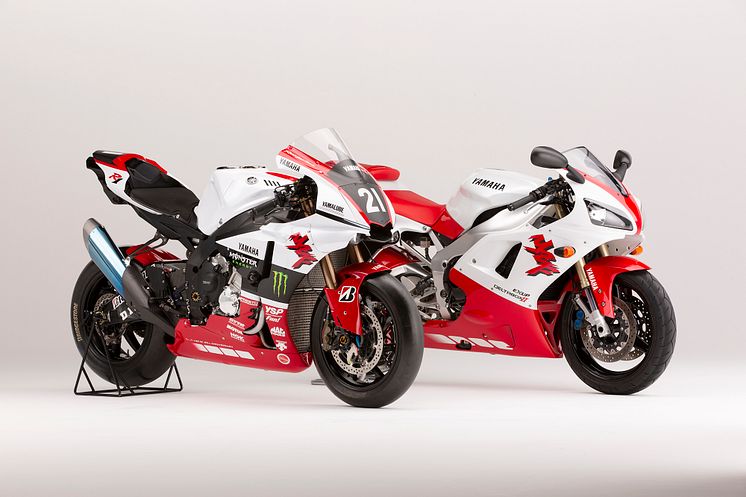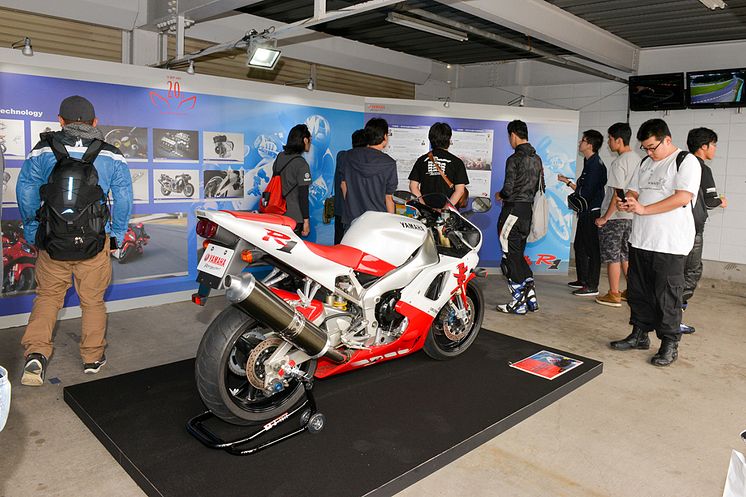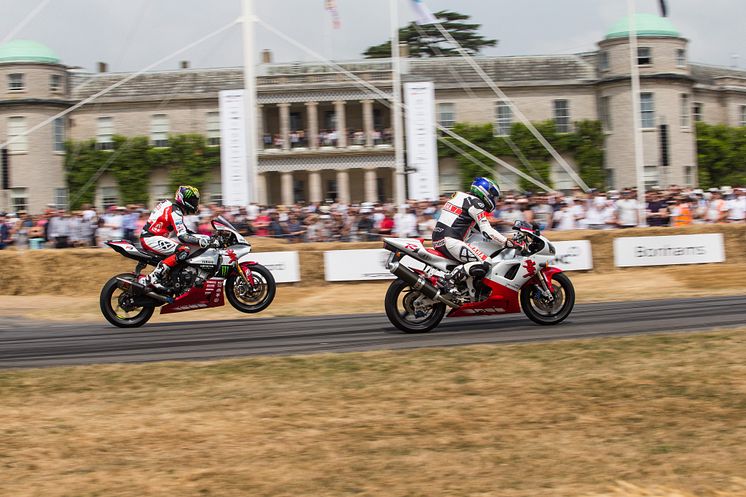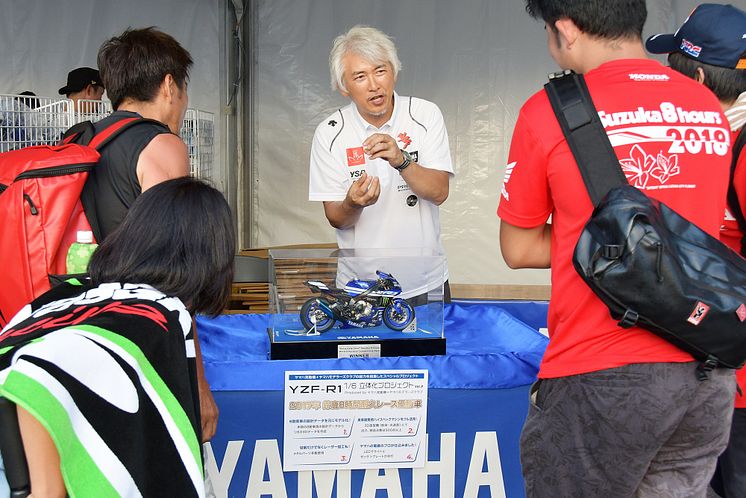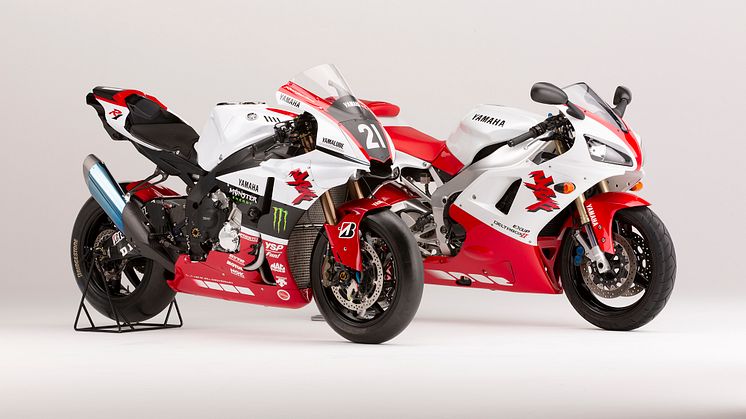
News -
Yamaha’s Flagship Superbike Yamaha Motor Newsletter (August 10, 2018 No. 66)
Yamaha’s YZF-R1 flagship motorcycle has continued to set trends in the 1,000cc supersport category through advanced ideas and cutting-edge technologies since its introduction in 1998. Although the bike has not been drastically changed in 2018, the now highly developed 8th-generation R1 continues to notch up wins at racetracks across the globe.
In Japan and in the U.K., special events for R1 owners were held to commemorate the model’s 20th anniversary among other celebrations, and the R1’s presence only continues to grow.
Alongside the likes of the YDS-1, XS-1, XJ750E (XJ650) and FZ750, the R1 is undoubtedly in contention as one of Yamaha’s legendary models. In this issue, we look at its 20 years of history and at some topics that celebrate this incredible machine.
Pursuing the Essence of a Supersport Motorcycle
The joy of riding a motorcycle can take many forms, like the sense of freedom that comes with a slow cruise on the open road or the thrill and exhilaration felt with hard acceleration.
“The real fun of a supersport machine is the pleasure a rider feels when actively controlling the bike and aggressively navigating twisty roads,” said the first R1’s project leader. “You brake, tip the bike into a turn, find the perfect line and work the throttle to swiftly accelerate out of the turn. Performing all the various operations involved to make this happen just as you intended is what we thought to be the real joy of these bikes.” The aim was to create a next-generation supersport machine and build into it the greatest excitement possible for a rider in every area, by making it the undisputed leader when riding it, looking at it or even touching it. Thus, the keyword for the first R1’s development was “Excitement.”
But in the 1990s, the trend with 750cc+ big-displacement supersport machines was for powerful all-rounders designed primarily for high-speed performance. Yamaha’s engineers were looking to build something that would break this trend, however. They took Yamaha’s leading liter-bike of the day, the YZF1000R Thunderace, and stripped away everything deemed unnecessary. They then measured the effects of the extensive weight reduction and ran track tests as well.
With that in mind, they redesigned the chassis with the same dimensions as the YZR500 factory GP racebike to create an all-new design. Focusing on delivering a good balance of torque and power for the engine, they chose a 1,000cc in-line four-cylinder layout. The result was a machine that overturned the idea of a supersport bike, with the 177 kg dry weight and maximum output of 150 PS giving it a power-to-weight ratio of 1.18—specs that were simply on a different level than anything before. When the first YZF-R1 went on sale in 1998, supersport enthusiasts all over the world were left spellbound.
Following its launch, other manufacturers quickly began following in Yamaha’s footsteps. The liter-bike market was suddenly bursting with activity and in the years that followed, Yamaha stayed one step ahead of the competition in upping both performance and quality. That approach continued with the current 8th-generation model, which was released as an all-new bike in 2015.
To commemorate the 20th anniversary of the R1 in 2018, a YZF-R Owner’s Meeting was held on June 23rd in the R1’s homeland of Japan. It was an enjoyable day spent with R-Series owners and fans, featuring a talk show with the developers of each R1 generation, a demo lap by the YZR-M1 MotoGP machine, a mock race with R-Series bikes and test rides.

At the commemorative event in Japan, R1 models from each epoch-making generation were on display with comments from the engineers that developed them along with tidbits of R1 history.
There was also a special event for R1 owners and enthusiasts in the U.K. to mark the bike’s 20th anniversary at Round 6 of the British Superbike Championship (BSB). Held at the Brands Hatch circuit between July 20 and 22, activities included displays of successive World Superbike machines and laps on the track for R1 owners. Also, the McAMS Yamaha team rode in special commemorative red and white liveried R1s that weekend, with Josh Brookes winning both races to the delight of the fans.
Also held in the U.K., the Goodwood Festival of Speed is one of the world’s biggest historic motorsports festivals and took place between July 12 and 15. With more than 100,000 people attending, the 1st-generation R1, a 2018 YZF-R1M, several race-spec R1s and Yamaha’s autonomous motorcycle-riding humanoid robot, MOTOBOT Ver. 2, were all on display. Yamaha Motor Europe President Eric de Seynes, Yamaha World Superbike stars Alex Lowes and Michael van der Mark, and WorldSBK legend Noriyuki Haga—he began riding an R1 in the series from 2005—all rode up the hill for the thousands of visitors in attendance. The past, present and future of Yamaha were all on display.

At the Goodwood Festival of Speed, Yamaha Motor Europe President Eric de Seynes (right) rode the 1st-gen R1 and Yamaha BSB rider Josh Brookes rode the 8th-gen R1 in Suzuka 8 Hours colors.
The Results of Enhancing Racetrack Performance
The YZF-R1 was originally developed with a strong emphasis on performance for strafing twisty roads, but as it evolved over the years, the direction of development shifted. Racetrack performance gradually became a greater focus, and when WorldSBK changed its displacement regulations for 4-cylinder machines from 750cc to 1,000cc in 2003, it only intensified the switch. When the 6th-generation R1 was introduced in 2009, it featured a new engine with a crossplane crankshaft based on the one employed in the title-winning YZR-M1 MotoGP machine. With this new R1, Ben Spies won the WorldSBK title in his first attempt, the Yamaha Austria Racing Team (YART) won the Endurance World Championship (EWC) title and Katsuyuki Nakasuga won the All Japan Road Race Championship’s JSB1000 title. The following year saw the R1 claim another accomplishment as Josh Hayes won the AMA Superbike title to cap off a fantastic introduction of the 6th-generation YZF-R1.
In 2015, the 8th-generation R1 was launched, equipped with the first 6-axis Inertial Measurement Unit (IMU) on a production motorcycle. The all-new R1 was dominant that year as Cameron Beaubier won the inaugural MotoAmerica Superbike Championship, Josh Brookes won the British Superbike Championship and Katsuyuki Nakasuga won the All Japan JSB1000 title again, not to mention the Yamaha Factory Racing Team clinching Yamaha’s fifth Suzuka 8 Hours victory aboard it.
For 2018, Yamaha designed a special 20th anniversary livery for the bike featuring the iconic colors and logos from the 1st-generation R1. At the Suzuka 8 Hours, the final round of the EWC, the Yamaha Factory Racing Team, GMT94 Yamaha Official EWC Team and YART Yamaha Official EWC Team all entered R1s sporting the commemorative livery, and Yamaha took an unprecedented fourth consecutive victory to celebrate the bike’s 20th year.
But it was no easy feat. On July 29th, the day of the race, the remnants of Typhoon Jongdari that had passed over through the night before ensured that the race started under rainy skies. Thanks to the weather throwing curve balls with sudden showers during the race, the track conditions varied wildly throughout, which made for a sometimes-chaotic race over the eight hours.
The Yamaha Factory Racing Team started from 3rd on the grid and quickly broke away from pursuers at the start before engaging in a scrap for the lead. As rival teams gradually began to fall behind due to different pit stop timing, on-track accidents and average laptimes, Michael van der Mark and Alex Lowes set a fast but steady pace. Precisely-timed pit stops and quick pit work also allowed them to widen the gap at the front. By the end of the race they had secured a record-breaking fourth straight victory for Yamaha.

Commemorative colors adorned the R1s for the YART Yamaha Official EWC Team (left), the Yamaha Factory Racing Team (center) and the GMT94 Yamaha Official EWC Team (right) at the 2018 Suzuka 8 Hours.
Models Made with Affection and Displayed with Admiration
Models are items familiar to just about anyone and they can be great tangible gifts or as one way to give shape to a vivid memory. In the fall of 2018, renowned Japanese plastic model maker Tamiya, Inc. will release a 1:12 scale model YZF-R1M created based on the actual 3D design data from Yamaha. Tamiya has already created and released a model for the 1st-generation YZF-R1, and it was on display alongside the upcoming R1M model and both actual machines at an event at a Tokyo department store. This naturally generated a good deal of excitement among modelling fans at the event.
However, such models need something extra to ensure they delight the most dedicated of enthusiasts. With the R1’s 20th anniversary approaching, a group of Yamaha employees with a passion for modelling got together to create a scale replica of the YZF-R1 that got Yamaha its third consecutive Suzuka win in 2017. The final product was unquestionably authentic.
Fully employing Yamaha’s in-house network, they took the same design data used to build the R1 and converted it into 1:6 scale 3D data. From there, over 500 individual resin, acrylic and metal parts were produced with 3D printers and precision-
machined. Detailed down to the level of individual bolts, the model is also equipped with LED lights fitted by a professional electrician. The graphics for its decals were also created from the original 3D data, making this a minutely-detailed and faithful scale replica of the race-winning bike.
The model was unveiled at Japan’s foremost modelling show. Following that, it was put on display at the Communication Plaza at Yamaha Motor headquarters, Iwata City Hall, the Yamaha fan booth at the Suzuka 8 Hours and other places, where it surprised many with its incredible level of detail and quality.
The YZF-R1 shall continue to be the symbol of Yamaha’s Monozukuri
(engineering, manufacturing and marketing products with an emphasis on craftsmanship and excellence) based on our
Jin-Ki Kanno ideal to bring Kando in every moment one rides, sees or touches a motorcycle.

The 1:6 scale model of the R1 that won the 2017 Suzuka 8 Hours was on display at the 2018 edition. Race fans were taken aback by the level of detail.

|
Message from the Editor The Yamaha Motor homepage has featured many paper craft models of motorcycles and the like since 1997. These include 1:6 scale recreations of the 1st-generation YZF-R1 and 2007 R1. You can also find the 2015 YZF-R1M, which is a part of the Ultra-Realistic Paper Crafts series—none of which are easy to complete. So, for the R1’s 20th anniversary, why don’t you challenge yourself to complete one of these paper crafts? *Note: This content will be unavailable after September 30, 2018. Naoto Horie |
